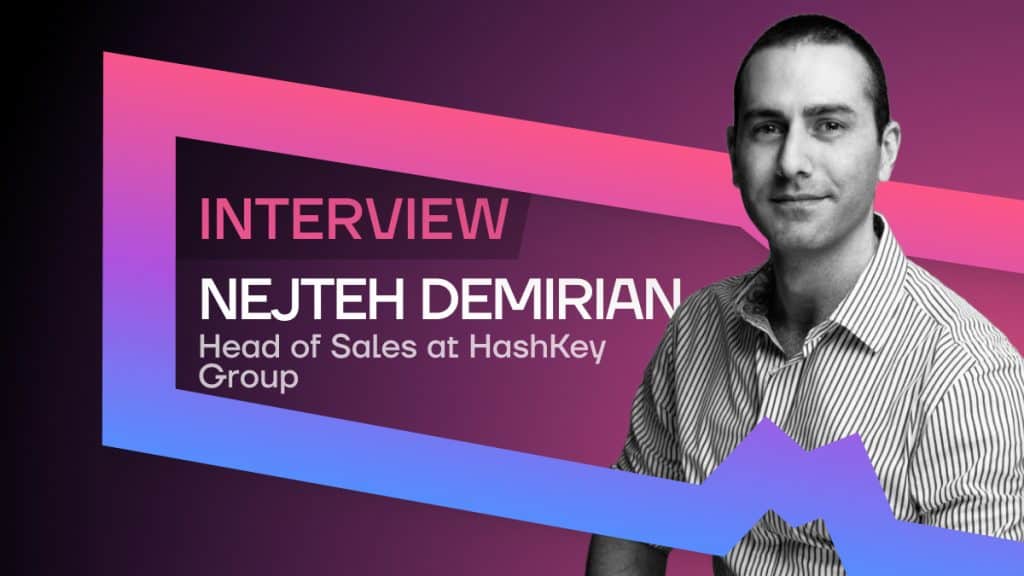Nejteh Demirian, Head of Sales at HashKey Group, Shares Insights on the Future of Crypto at Hong Kong Web3 Festival


With over a decade of experience in investment management and technology, Nejteh Demirian, head of sales at HashKey Group, brings a wealth of expertise to the table. Prior to joining Hashkey, he held a key role as Portfolio Manager and founding member at Hong Kong-based family office Fountainhead Partners.
During his tenure, he managed multi-asset portfolios across various asset classes. Additionally, he co-founded an incubator that focuses on building innovative SaaS and digital asset projects. At Hong Kong Web3 Festival, Metaverse Post co-founder Danil Myakin speaks to Demirian about current movements in the crypto market and how web3, the metaverse, and AI will intersect in the future.
How do you like Hong Kong? Are you based here?
Yeah, I’m based in Hong Kong. I think the events have been a real eye-opener for a lot of people, and there’s a lot of capital coming to Hong Kong. The regulations are definitely helping, and it’s going to attract international capital too.
Can you tell me a bit more about your background? What did you do, what kind of clients do you work with, and what do you actually do?
We look after institutional clients, we look after corporate clients, and there are some ultra-high net worth professional investors as well that come to us. We provide exchange services. So we have an exchange that’s licensed by the SFC. So type one, type seven license. And what we aim for is to provide a venue for institutional and professional investors to trade on.
You’re talking about the Hashkey Pro, right? Can you tell me a bit more about your strategy around Hashkey Pro and what kind of goals you want to achieve with it?
The goal here is to be the main venue for investors in Hong Kong and globally to come and trade for anything related to digital assets. For professional investors, it will include security tokens, and for retail, eventually, it may include traditional tokens that everyone’s quite familiar with.
There’s a huge discussion right now about the hub in Asia, a country or a city that’s gonna be the hub. There are a few of competitors: Singapore, Hong Kong, Japan, and Korea. What do you think is the best place to be in, and who are you betting on?
Hong Kong’s the predominant liquidity center for traditional assets. That’s for a good reason; it’s one of the biggest economies in the world, so there’s naturally going to be liquidity coming through. As such, it attracts a lot of capital as well from other places because the more liquid market attracts more liquidity as well. Being in that kind of position is a very good privilege that Hong Kong can enjoy compared to other markets. You could just say that Hong Kong is definitely an international hub. It’s very open for foreign investors; it’s very open for migrants to come here and work in Hong Kong. The established frameworks are very robust, and it’s probably one of the best in the world in terms of a venue that can attract capital talent.
When you look at other jurisdictions, I don’t think I can say much. I haven’t lived in those places, but I do understand that there are a lot of other considerations that you have to take care of, like immigration policies tax, that might not be beneficial for projects, investors, and workers, employees.
Can you explain a bit more about Hashkey because people associate the company with being a VC. So can you tell us a bit more about what Hashkey Capital is?
Hashkey is one of Asia’s leading virtual asset platforms. We have an exchange business. That’s one of the main businesses we’re launching in the region. There’s a node validation service that we offer as well, and there’s a venture capital arm. So it’s a wide platform. It goes through the web2 and web3 transition in terms of an ecosystem as well, and that’s what we’re supporting. We’re going to be supporting platforms that come through other platforms, other web2 companies that want to get into web3. We also have a very strong development team in web3 building in-house web3 solutions.
Let’s talk a bit about the market because everybody wants to read about the market. So the crypto market has shown recent price movements even though we’ve seen pretty scary things in the banking industry and the overall stock market. So how do you feel about the market right now?
I think there was a lot of fear in the market around what’s happening within the global banking system. And that’s as a function of macrocycles, that really comes to macro policy driven by the Fed. I think the movements that we saw, especially in Bitcoin, were really an earlier response mechanism to the fear that there is potentially a decoupling that can happen, but whether or not this is going to be consistent, that’s up to the market to decide. It’s up to institutional investors to start looking at an investment thesis.
If you break it down into what’s going to be generating future adoption or investment into the asset class and in growth in the institutional space, it’s largely going to be predicated on real money entering. For real money to enter, you’re looking at allocations far exceeding 1%, or 2%, of their total AUM for funds for global allocators. There’s got to be investment frameworks set up and investment committees to take responsibility for those allocations. That takes a lot of time.
What we saw recently is probably like an early glimpse of the wider market, especially more on the retail side, coming to a realization that there’s a potential that it does offer some diversification from certain currency risk, which is US dollars. Whether or not the timing of that is going to be sooner or later, it’s really something that it’s dependent on real money and how they start to allocate, and I think it’ll take a while for that to continue to happen. But it is very positive as a signal.
The whole crypto community rooted for this, kill the banks, and now it’s happening.
You don’t necessarily want that to happen. You want digital assets to become part of the system. Eventually, if you believe that it is going to be a dominant kind of mechanism for wealth transfer or payments, you have to believe that it is going to be a mainstream part of the financial system, which means that it takes over from what the banks do.
Eventually, it’s part of the banks because there still have to be mechanisms to centralize certain governments or regulators as well. Now, it really shifts in terms of the business models for what the banks need to do in the future, but I think it should be more transformative rather than like destructive.
I have to talk to you about the metaverse. What do you think about the metaverse?
There are a couple of different views I have on it. One is very simplistic in nature, which is what you’ve been seeing with some listed companies talking about metaverse. The very naive kind of perception of what the metaverse represents, which is a digital representation of yourself.
It could be that, but I think it’s a lot more philosophical as well. I think it’s how your interaction with the world and data points in the world can come together with the digital collection of these data points and how it’s represented to improve your life. That’s a really complex kind of viewpoint, right? I can’t sit here and even start to begin how they can convert, but I do feel that if we’re going to look at the metaverse, a better kind of view of it would be how we augment our reality. I’m not saying augmented reality, but rather how we augment reality to be able to cope with the data flow, the networks, and the communications that we do. I think the fuller integration of that will probably be the start of it.
On the furthest end of it. I think it’s going to allow a far deeper kind of connection with the digital layer or the data layer as well. So I don’t know what that will look like. Like, I think it’ll be far more sophisticated than just 3D glasses or augmented reality glasses, for instance. So it’s a really deep discussion. I think it’s that the ecosystem will have so many solutions that’ll come together, and the amalgam of that will result in result in something that we call metaverse.
I like your thoughts about data points and how it’s harder to manage, and it’s gonna be harder and harder.
Let me give you an example. We go to these conferences and talk about the metaverse, but in reality, we’re getting contacts down on Telegram; no one’s being able to follow up on that. There’s no recall; there’s no memory that those data points will be recorded; there’ll be an AI integration that sits there and reminds you of who you met up with and all that will be part of it, that it requires really sophisticated technology requires higher bandwidth that we’re currently using.
I couldn’t even access the internet here properly, and 90% of the interactions you’ve had are not even recorded. I saw some presentations and guys coming up with social solutions. They’re trying to integrate that into our AI model, but until that AI model actually integrates with your Telegram or some kind of voice recording and a camera at the same time that records that instance, it’s useless. So I think that that’s probably somewhere in between what the full metaverse might look like.
You’ve already kind of started answering my next question. At Metaverse Post, we’re into AI: We write about it and use it for different things. Can you expand on what kind of role AI will play in the metaverse and how it will influence it?
Yeah, that’s part of the augmentation function that I mentioned earlier. I think that it really augments your ability to filter, remember, and process on an individual level. That information that’s around, I think it’d be a huge element of that. It was kind of funny like three, four years ago, I used to make a joke with a few of my colleagues in investment management as well, where we would see people talking about, throwing the catchwords about AI, blockchain, and IoT together and they’re just throwing those words out just to attract more attention. But the reality is that now I think about it, they might have been ahead of the curve. It has to come together at some point and actually work together.
The Internet of Things on your hardware and the tools that you use and the AI to process it, and the blockchain to store it in terms of the data. I think there’s a huge, huge element of the combination.
What role is web3 going to play in the metaverse, and why is web3 important for the future of the metaverse?
Web3 is a natural layer on top of web2; I don’t see web2 being completely thrown out. I think web2 also created the origins of big data that was used to process, to start using AI to look at data points and classify them or use other algorithms to help businesses create better models. I think web3 is just the natural extension of that. We are yet to see the web3 kind of class that really starts to dominate. I think, eventually, they are going to be sitting on top of the web2 businesses. At some point, transitions will happen slowly as well, and what we will likely have is a more stakeholder-driven society. I think that’s the end result with web3.
When you look at web2, you look at the way in which web2 propagated the developer communities and developer networks. They didn’t necessarily all participate in the upside of developing certain languages or certain programming languages or the dotnet framework. Some of them failed, and they weren’t rewarded for their development. I think web3 kind of captures that, and that’s the end goal. It’s the most seamless transition of the benefits derived from economic profits that are generated that transitions to the entire community, including developers, stakeholders, and users as well. That’s the next layer on web2.
I believe that there’ll be some web2 companies that’ll be coming through that are starting to slowly learn that it’s not necessarily in their best interest because they’re used to a centralized model; they’re used to capturing full economic profits. And now it’s going to be a different model. But for them to survive, they will be forced to do that.
When you have developers now having the option to say, “Okay, I can develop on this framework that feeds into a centralized business model, and I can potentially make some money from it,” or “I can go into a web3 protocol and develop on that and participate in each growth,” they’re obviously going to choose the latter. And then if the web2 companies start to realize that they won’t have that necessary critical mass in developers, I think that’s when they’ll start making that shift because they’ll realize that they can’t compete.
Disclaimer
In line with the Trust Project guidelines, please note that the information provided on this page is not intended to be and should not be interpreted as legal, tax, investment, financial, or any other form of advice. It is important to only invest what you can afford to lose and to seek independent financial advice if you have any doubts. For further information, we suggest referring to the terms and conditions as well as the help and support pages provided by the issuer or advertiser. MetaversePost is committed to accurate, unbiased reporting, but market conditions are subject to change without notice.
About The Author
Serial crypto entrepreneur, VC fund partner, and CEO of the Metaverse Post.
More articles

Serial crypto entrepreneur, VC fund partner, and CEO of the Metaverse Post.



















































